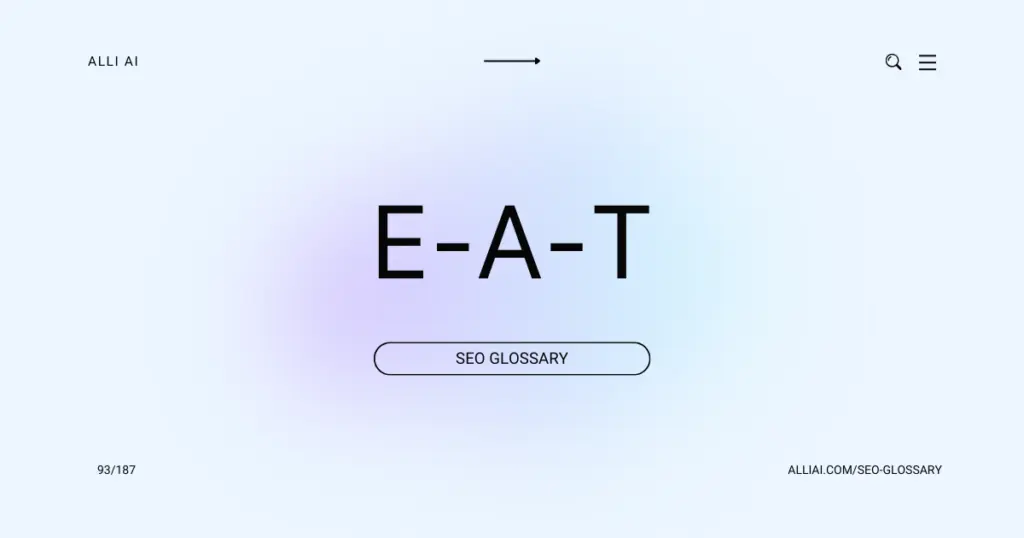What Does E-A-T (Expertise, Authoritativeness, Trustworthiness) Mean?
E-A-T stands for Expertise, Authoritativeness, and Trustworthiness. It is a framework used by Google to assess the quality of content on a website. Expertise refers to the knowledge and skill of the content creator in a specific field. Authoritativeness is about the credibility of the website publishing the content, as well as the content author. Trustworthiness relates to the reliability and honesty of the content and its source. Google uses these criteria to ensure that users receive high-quality, accurate, and reliable information from their search results.
Where Does E-A-T (Expertise, Authoritativeness, Trustworthiness) Fit Into The Broader SEO Landscape?
E-A-T is crucial in SEO primarily for improving content quality and relevance, which directly influences a website’s ranking signals to search engines like Google. It is heavily integrated into Google’s Search Quality Rater Guidelines, influencing how content is evaluated by human raters as part of Google’s algorithm training process. This concept affects the broader SEO landscape by:
1. Content Quality: Websites providing high-quality content that demonstrates expert knowledge and insight on a subject are likely to rank better. Content must be factual, detailed, and offer value beyond what’s available on other sites.
2. Link Building: Authority is partly gauged by the quality and relevance of inbound links. Sites with high E-A-T are more likely to acquire natural, high-value backlinks from other authoritative sources.
3. Online Reputation: Trustworthiness encompasses reviews, testimonials, and overall online reputation management. Google considers both the website’s and the content creator’s reputation as a ranking factor particularly for YMYL (Your Money Your Life) sites.
4. User Experience: Trust factors also play into site security and user experience. Secure sites (HTTPS) with clear, user-friendly navigation and reliable, consistent information encourage a trust relationship with users and subsequently with search engines.
5. Social Signals: While not a direct ranking factor, social signals reflect engagement and reputation, indirectly affecting E-A-T. High engagement and sharing by reputed accounts can enhance perceived authority and expertise.
By focusing on E-A-T within their SEO strategies, businesses can potentially improve their visibility in search results, especially for queries that require highly reliable and authoritative answers.
Real Life Analogies or Metaphors to Explain E-A-T (Expertise, Authoritativeness, Trustworthiness)
1. Expertise: Picture a master chef trained in the finest culinary school, skilled in crafting delectable dishes. Their knowledge of cooking, understanding of flavors, and technical skills are akin to the expertise aspect of E-A-T, where content creators deeply understand their subject matter.
2. Authoritativeness: Imagine a seasoned captain steering a large ship through tumultuous seas. The crew and passengers trust the captain’s decisions because of her proven experience and the respect she commands in the maritime community. Similarly, authoritativeness in E-A-T reflects how much a creator or a website is respected and acknowledged by peers in their field.
3. Trustworthiness: Consider a trusted local banker whom townsfolk visit for advice on safeguarding their life savings. His reliable and honest reputation, ensuring customers’ peace of mind, mirrors the trustworthiness aspect of E-A-T, where users feel secure in the accuracy and sincerity of the information provided.
How the E-A-T (Expertise, Authoritativeness, Trustworthiness) Functions or is Implemented?
1. Expertise:
– Content Creator Qualifications: Google evaluates the formal qualifications, practical knowledge, and hands-on experience of content creators. For topics requiring expertise (like medical advice), credentials are scrutinized more rigorously.
– Depth of Content: Detailed and comprehensive content on a topic is a mark of expertise. Expert content typically covers a wide breadth of subtopics and provides insightful analysis not available on general sites.
2. Authoritativeness:
– Site Reputation: A website’s reputation among other experts and authoritative sites in the same domain influences its perceived authority. Positive engagement from reputed professionals or endorsements through citations and mentions significantly boost authority.
– Quality of Backlinks: Links from well-regarded sites act as endorsements, enhancing a website’s authority. The relevance and quality of linking domains are key factors in establishing authoritativeness.
3. Trustworthiness:
– Secure and Transparent Websites: Secure connections (HTTPS), clear privacy policies, and accessible contact information establish a site’s credibility. Transparency about affiliations and advertising also strengthens trust.
– User Experience and Safety: Positive user interactions, absence of malicious software, and user safety measures on a website enhance its trustworthiness. High user engagement (low bounce rates, high time on site) generally correlates with higher trust.
– Accuracy and Fact-Checking: Regular updates, fact verification, and error-free content accuracy boost a site’s trustworthiness. Misleading information or errors can damage trust significantly.
E-A-T factors are not direct ranking signals in the Google algorithm but influence overall content quality and site performance in search results. These elements are integral to Google’s Quality Rater Guidelines, influencing manual ratings that help adjust the algorithm over time.
Impact E-A-T (Expertise, Authoritativeness, Trustworthiness) has on SEO
E-A-T significantly impacts SEO by directly influencing how Google assesses the quality of a website’s content, which affects rankings. A high level of Expertise ensures that the content is accurate and insightful, improving engagement and reducing bounce rates. Authoritativeness builds a site’s reputation through quality backlinks and mentions from reputable sources, which enhances domain authority and increases visibility in search rankings. Trustworthiness, assured by secure browsing, clear privacy policies, and accurate, transparent author information, reduces the risk of penalties from Google and builds user confidence. Collectively, E-A-T raises page rankings as Google prioritizes sites that reliably provide value to users, translating into improved user experience, potentially higher conversion rates, and increased organic search traffic.
SEO Best Practices For E-A-T (Expertise, Authoritativeness, Trustworthiness)
1. Display Credentials: Include clear information about the qualifications, certifications, or relevant experiences of content creators directly on the page where applicable.
2. Author Bios: Implement detailed author biography pages that showcase the expertise and professional background of authors. Include links to their professional profiles (LinkedIn, academic publications).
3. Update Content Regularly: Ensure that all content is current and reflects the latest information and research in the field. Regularly update older content to keep it relevant.
4. Cite Sources: Use credible and reputable sources to back up claims. Provide citations, references, and links to these sources.
5. Secure Website: Implement HTTPS to secure your site. Make sure the security certificates are up to date.
6. Professional Website Design: Ensure the website has a professional design, easy navigation, and is free from an excessive amount of ads.
7. User Reviews and Testimonials: Display genuine user reviews and testimonials that endorse the credibility of the offered information or services.
8. Official Endorsements: Gain and showcase endorsements, accreditations, or awards from recognized authorities in the field.
9. Privacy Policy and Contact Information: Clearly state the privacy policy and include up-to-date contact information on your site. Make it easy for users to contact you.
10. Social Media Verification: Work on getting social media profiles associated with the business verified to further establish credibility.
11. Get Linked by Authority Sites: Aim to get backlinks from websites that are considered authorities in your domain to enhance your own site’s trustworthiness.
12. Content Depth: Publish thorough, well-researched and comprehensive content that covers topics in depth to demonstrate expertise in the subject matter.
13. Community Engagement: Engage with your audience through comments, forums, or social media. Answer queries, participate in discussions, and gather feedback.
14. Transparent Advertising: Clearly distinguish editorial content from paid advertisements or sponsored content to maintain trust with your audience.
15. Audit Content Regularly: Periodically review your content to ensure it maintains high standards of accuracy and factual correctness.
Common Mistakes To Avoid
1. Ignoring Author Profiles:
– Solution: Enhance the credibility of your content by creating detailed author profiles with professional bios, photos, and links to their credentials. Ensure that the authors contributing to your site have verifiable expertise in their respective fields.
2. Lack of Citations and Supporting Data:
– Solution: Strengthen articles by referencing authoritative sources, such as research studies or official statistics. Adding citations not only validates the information provided but also shows that your content is research-backed.
3. Not Monitoring User-Generated Content:
– Solution: Implement strict moderation policies and regular reviews to ensure user comments or forum posts adhere to quality standards. This helps maintain the trustworthiness of your platform.
4. Neglecting Content Updates:
– Solution: Regularly review and update older content to keep it relevant and accurate. This showcases ongoing commitment to providing current and authoritative information.
5. Poor Quality External Links:
– Solution: Audit external links regularly to ensure they lead to reputable and relevant sites. Replace or remove any links that lead to questionable or outdated sources.
6. Inconsistent Content Quality:
– Solution: Establish and adhere to a content quality guideline that all pieces must meet before publication. This standardization helps in maintaining a consistent level of authority and trustworthiness.
7. Failing to Secure Website:
– Solution: Implement security measures like HTTPS to protect the integrity and confidentiality of your users’ data. A secure site boosts user trust and supports your site’s trustworthiness.
8. Lack of Transparency:
– Solution: Maintain open channels for user feedback and clearly display your privacy policies and terms of service. Transparency in operations enhances trustworthiness.
9. Ignoring Social Proof and Reviews:
– Solution: Encourage satisfied customers to leave positive reviews and testimonials. Highlighting these can significantly boost the perceived trustworthiness of your service or product.
10. Narrow Content Scope:
– Solution: Diversify your content to cover broader topics within your niche. This not only demonstrates expertise but also builds authority as a go-to resource in the industry.
By addressing these areas proactively, you can significantly enhance the E-A-T of your website, thus improving your SEO performance and user trust.






